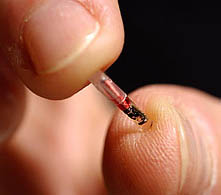VeriChip - a Human-implantable RFIDVeriChip is a human-implantable RFID (radio frequency identification) device from VeriChip Corporation, a wholly owned subsidiary of Applied Digital Solutions of Delray Beach, Florida.
VeriChip is the first FDA-approved human-implantable RFID microchip. VeriChip received United States Food and Drug Administration approval in October 2004. About twice the size of a grain of rice, the device is typically implanted above the triceps area of an individual’s right arm. Once scanned at the proper frequency, the VeriChip responds with a unique 16-digit number which can correlate the user to information stored on a database for identity verification, medical records access and other uses. The insertion procedure is performed under local anesthetic and once inserted, is invisible to the naked eye. The process can be performed in a physician’s office and takes only a few seconds. Primarily marketed for medical applications, the VeriChip can link patients to their password-protected medical history, advance directives, important contact information and other related information in VeriChip-enabled emergency rooms during the first few minutes of care. As of January 2006, 68 U.S. hospitals had signed up to adopt the technology in their emergency rooms. The company estimates that approximately 2000 people currently have a VeriChip worldwide. On 2006-02-10, a surveillance company in Cincinnati became the first American business to use the VeriChip for access to its datacenter. Implant Controversy Privacy Privacy advocates have also protested the VeriChip, labeling all such RFID devices as "spychips". While the debate continues, VeriChip’s passive RFID transmission capabilities (limited to a matter of inches) and user-controlled information sharing limit the risk of any type of GPS tracking capability or identity theft. Security This article is licensed under the GNU Free Documentation License. It uses material from the Wikipedia article "VeriChip". | |
FOOTER MENU |
email: info@rfidradiofrequencyidentification.co.uk
copyright © 2006 Joseph Arnold Publications
Home RFID Technology Human Microchip Implant RFID Solution Providers RFID Privacy RFID Resources RFID Books RFID Mandates Website Privacy Policy Copyright Disclaimer Site Map